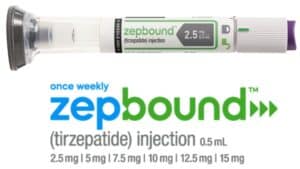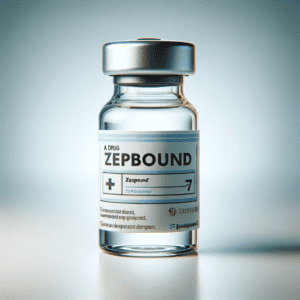
What Is Zepbound?
What Is Zepbound?
Zepbound, also known as Tirzepatide, is a promising weight loss drug that has gained attention in recent years. With obesity rates on the rise globally, finding effective weight loss solutions has become increasingly important.
Zepbound offers hope for individuals struggling with weight management by providing a new approach to tackling obesity.
In this article, we will explore how Zepbound works, its effectiveness based on clinical trials and research studies, its comparison to other weight loss drugs, potential side effects and risks, dosage and administration guidelines, impact on other health conditions, cost and availability, as well as future developments and potential uses.
How Tirzepatide Works
Tirzepatide works by targeting multiple hormone receptors in the body to regulate appetite and glucose metabolism. It is a dual glucose-dependent insulinotropic polypeptide (GIP) and glucagon-like peptide-1 (GLP-1) receptor agonist. GIP and GLP-1 are hormones that play a crucial role in regulating blood sugar levels and satiety.
By activating these receptors, Tirzepatide helps to increase insulin secretion, decrease glucagon secretion, slow down gastric emptying, and reduce food intake.
The mechanism of action of Tirzepatide promotes weight loss through various pathways.
- Firstly, it increases insulin secretion, which helps to regulate blood sugar levels and prevent excessive glucose production. This can lead to a decrease in appetite and food cravings.
- Secondly, Tirzepatide slows down gastric emptying, which means that food stays in the stomach for longer periods, leading to increased feelings of fullness and reduced calorie intake.
- Lastly, Tirzepatide also promotes fat burning by increasing the breakdown of stored fat in the body.
Clinical Trials and Research Studies
Numerous clinical trials and research studies have been conducted to evaluate the effectiveness of Tirzepatide as a weight loss drug. One notable study was the SURPASS-1 trial, which involved over 1,800 participants with obesity or overweight. The results showed that Zepbound led to significant weight loss compared to a placebo, with participants experiencing an average weight loss of 14.9% of their initial body weight after 52 weeks of treatment.
Another study, known as the SURMOUNT-1 trial, compared Tirzepatide to semaglutide, another popular weight loss drug. The results showed that Zepbound was non-inferior to semaglutide in terms of weight loss, with both drugs leading to similar reductions in body weight. However, Zepbound had a better safety profile and was associated with fewer gastrointestinal side effects compared to semaglutide.
Comparison to Other Weight Loss Drugs

What Are The Best Prescription Weight Loss Drugs?
When comparing Zepbound to other weight loss drugs on the market, it is important to consider the advantages and disadvantages of each option.
One advantage of Zepbound is its dual mechanism of action as a GIP and GLP-1 receptor agonist.
This means that it targets multiple pathways involved in appetite regulation and glucose metabolism, potentially leading to better weight loss outcomes. Additionally, Zepbound has shown promising results in clinical trials, demonstrating its effectiveness in promoting significant weight loss.
On the other hand, some weight loss drugs may have different mechanisms of action or target specific receptors in the body. For example, Orlistat works by inhibiting the absorption of dietary fat in the intestines, while Phentermine suppresses appetite by affecting the central nervous system.
These drugs may be effective for certain individuals, but they may also come with their own set of side effects and limitations.
Potential Side Effects and Risks
What Is Zepbound? Like any medication, Tirzepatide does come with potential side effects and risks. Some common side effects reported in clinical trials include nausea, vomiting, diarrhea, and constipation. These gastrointestinal side effects are usually mild to moderate in severity and tend to improve over time. However, it is important to note that individual experiences may vary, and some individuals may be more susceptible to these side effects than others.
In rare cases, Zepbound may also cause more serious side effects such as pancreatitis, gallbladder disease, and kidney problems. It is important for individuals considering Zepbound as a weight loss option to discuss their medical history and any pre-existing conditions with their healthcare provider. Precautions and warnings should be taken into account, especially for individuals with a history of pancreatitis or gallbladder disease.
Dosage and Administration Guidelines

Vial of Zepbound
The recommended dosage of Zepbound for weight management is typically started at a low dose and gradually increased over time. The drug is administered once weekly via subcutaneous injection.
It is important for individuals to follow the dosage and administration guidelines provided by their healthcare provider to ensure safe and effective use of the medication.
It is also important to note that Zepbound should be used in conjunction with a healthy diet and regular exercise. Weight loss medications are not a standalone solution, but rather a tool to support lifestyle changes.
Individuals should work closely with their healthcare provider or a registered dietitian to develop a personalized weight loss plan that incorporates Zepbound and other lifestyle modifications.
Impact on Other Health Conditions
In addition to its weight loss benefits, Zepbound may also have a positive impact on other health conditions. For individuals with type 2 diabetes, Zepbound has shown promising results in improving glycemic control and reducing the need for diabetes medications. This is due to its ability to regulate blood sugar levels and increase insulin secretion.
Furthermore, Zepbound may also have cardiovascular benefits. Studies have shown that weight loss can lead to improvements in blood pressure, cholesterol levels, and overall cardiovascular health. By promoting weight loss, Zepbound may help reduce the risk of developing cardiovascular diseases such as heart disease and stroke.
Cost and Availability
The cost and availability of Zepbound may vary depending on the country and healthcare system. As a relatively new medication, it may not be widely available in all regions. However, as more research and clinical trials are conducted, it is expected that Zepbound will become more accessible to individuals seeking weight loss solutions.
In terms of cost, weight loss medications can be expensive, especially if they are not covered by insurance. It is important for individuals to check with their insurance provider to determine coverage and potential out-of-pocket costs. Additionally, some pharmaceutical companies may offer patient assistance programs or discounts to help make the medication more affordable.
Future Developments and Potential Uses
The future of Zepbound looks promising, with ongoing research and development in the field of weight management. Researchers are exploring the potential use of Zepbound in combination with other medications or therapies to enhance its effectiveness.
Additionally, there is growing interest in using Tirzepatide for the treatment of other conditions such as non-alcoholic fatty liver disease (NAFLD) and polycystic ovary syndrome (PCOS), which are often associated with obesity.
Furthermore, Zepbound may have potential applications beyond weight loss. Some studies have suggested that Zepbound may have neuroprotective effects and could be beneficial in the treatment of neurodegenerative diseases such as Alzheimer’s disease. However, further research is needed to fully understand the potential benefits and applications of Zepbound in these areas.
Conclusion of What Is Zepbound?
In conclusion, Zepbound (Tirzepatide) is a promising weight loss drug that offers hope for individuals struggling with obesity. Its dual mechanism of action, targeting multiple hormone receptors in the body, promotes weight loss through various pathways. Clinical trials and research studies have shown its effectiveness in promoting significant weight loss, with a better safety profile compared to other weight loss drugs.
While Zepbound does come with potential side effects and risks, these can be managed with proper precautions and monitoring. It is important for individuals to work closely with their healthcare provider to determine if Zepbound is the right option for them and to ensure safe and effective use of the medication.
As the field of weight management continues to evolve, Zepbound represents a revolutionary approach to tackling obesity. With ongoing research and development, it is expected that Zepbound will continue to play a significant role in the treatment of obesity and potentially other health conditions in the future.






